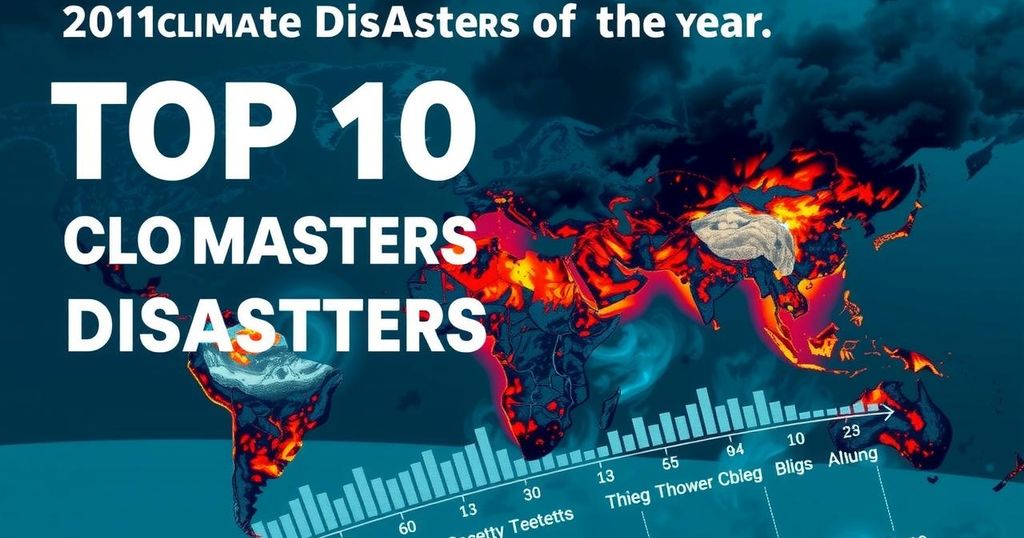World news
AFRICA, ASIA, BANGLADESH, BRAZIL, CHINA, CHRISTIAN AID, CLIMATE, CLIMATE CHANGE, EUROPE, GLOBAL WARMING, HELENE, IMPERIAL COLLEGE LONDON, LATIN AMERICA, MARIA, MARIAM ZACHARIAH, MEXICO, MILTON, NATURAL DISASTERS, NORTH AMERICA, PATRICK WATT, SOUTH AMERICA, SOUTHEAST ASIA, SPAIN, U. S, US, VALENCIA
Sofia Rodriguez
0 Comments
The Impact of 2024’s Climate Disasters: Human and Economic Consequences
In 2024, climate disasters caused $229 billion in damages and 2,000 deaths, with Hurricanes Helene and Milton as the most financially destructive events. The U.S. faced significant losses, while global events including typhoons and floods underscored the widespread effects of climate change. The report warns of underestimated economic impacts on uninsured communities and calls for urgent political action to address the climate crisis, highlighting the need for global resilience and sustainability efforts.
The year 2024 has been marked by devastating climate disasters that have resulted in $229 billion in damages and approximately 2,000 fatalities. The United States was particularly affected, bearing 75 percent of the financial burden, primarily due to Hurricanes Helene and Milton, which each caused record losses exceeding $75 billion. Additionally, extreme weather events, including typhoons and floods across Asia, Europe, and Latin America, highlighted the pervasive impact of climate change worldwide.
For the first time in recorded history, two hurricanes in a single year caused damages exceeding $50 billion. Helene and Milton dominated the list of costly disasters for 2024, underscoring how climate change has intensified extreme weather patterns. In total, the top ten climate-related catastrophes registered damages of over $4 billion each, with severe impacts noted from flooding in China and Brazil to Typhoon Yagi in Southeast Asia, emphasizing a growing trend of economic vulnerability due to extreme weather.
Beyond significant economic repercussions, these disasters have inflicted profound human suffering. Typhoon Yagi was notably the deadliest event, resulting in at least 829 lives lost. Other tragedies were recorded as well, such as storm Boris in Europe, which caused 26 deaths alongside $5 billion in damages, and flooding incidents in Brazil and Valencia. Lesser-known disasters, like droughts in Africa and heat waves in Bangladesh, further aggravated food insecurity and heightened health risks for the most vulnerable populations.
Experts assert that the ongoing climate crisis is exacerbated by anthropogenic factors. Dr. Mariam Zachariah from Imperial College London stated, “Most of these disasters bear the clear imprint of climate change.” The emphasis is on how fossil fuel combustion intensifies occurrences of storms, droughts, and heat waves, which are becoming increasingly severe. Furthermore, a report from Christian Aid mentions that the actual costs of such calamities may be much higher, especially since many individuals in impoverished regions are not insured, leading to an underreporting of economic damages.
In light of these alarming trends, Patrick Watt, CEO of Christian Aid, implored global leaders to take swift action, claiming, “Human suffering caused by climate change reflects political decisions.” He emphasized the urgency of fulfilling financial commitments to assist vulnerable nations disproportionately affected by climate change impacts, despite their minimal contributions to global emissions.
The events of 2024 serve as a stark reminder of the imperative to intensify global efforts against climate change. The experiences of Hurricanes Helene and Milton illustrate that wealthier nations are not immune to climate-related risks. However, the most impoverished countries are still severely compromised, facing challenges due to limited resources for recovery. Continuous climate disasters will likely escalate without earnest action to reduce reliance on fossil fuels and enhance infrastructure resilience.
The report from 2024 is not merely a record of damage but a clarion call for investment in climate resilience and proactive measures to diminish emissions. Addressing these issues is critical to safeguarding lives and economic stability. As the cloud of climate change looms larger, the momentum for global climate action must transition from awareness to tangible steps, with 2025 positioned as a pivotal year for renewed commitment.
This article examines the repercussions of climate disasters witnessed in 2024, which caused unprecedented economic losses and significant human tolls. It particularly highlights the severe impact in the United States from major hurricanes, while also acknowledging devastating climatic events around the globe. Such disasters underscore the pressing threat posed by climate change and the urgent need for global response and action, especially in relation to vulnerable countries that bear the brunt of ecological crises without sufficient resources.
In conclusion, 2024 has exposed the dire consequences of climate-related disasters, necessitating immediate action to mitigate their impact. The integration of robust climate policies and the fulfillment of international commitments to support vulnerable nations will be crucial in addressing these ongoing challenges. Without a significant shift in political will and collaborative effort to reduce greenhouse gas emissions and enhance resilience, the frequency and intensity of climate catastrophes will only escalate, further jeopardizing lives and economies worldwide.
Original Source: www.drivingeco.com




Post Comment